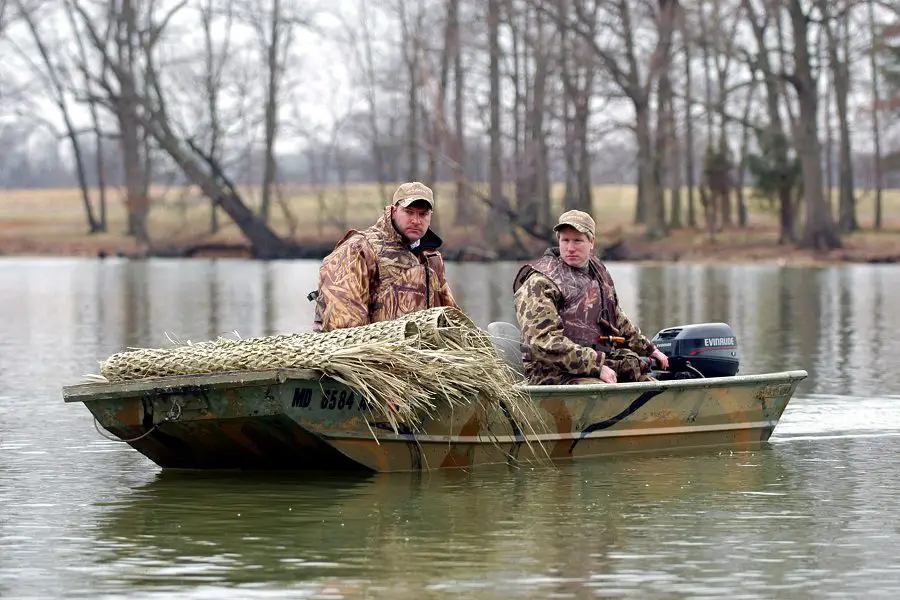SHTFPreparedness may collect a share of sales or other compensation from the links on this page.
Some hunters prefer to use their boat to reach their hunting destination or target a specific game, such as ducks in the water.
However, there is a lot to learn about bringing guns on a boat, and there are several rules that specify what is and isn’t permitted in the US.
How should firearms be transported in a boat? Taking firearms on a boat still requires you to follow safety advice and local laws, including those that pertain to boating and firearms.
Make sure to unload all guns, store the ammunition separately, and operate the boat carefully to prevent capsizing or rocking. To protect yourself and others, learn the basics of firearms and boats.
What Licenses Are Required?

Any time you travel on a boat, there are state, federal, and international laws to consider. For local hunters, you’ll need a concealed carry permit to carry your weapon on a boat, just like in a car.
Remember that you’ll need to have a permit there as well if you travel to another state or reside in an area where two states share water.
Some states have an agreement to transfer a carry permit over, but it doesn’t apply to all states. A boating license may also be required, depending on where you live.
Most US states require a boating license to operate a vessel safely and responsibly on the water, and the onus is on you, the driver, to understand your requirements.
A hunting permit may also be needed, depending on where you live and the game you want. This includes a valid hunting license, any necessary permits, and tags that must be with you at all times on board.
The Correct Storage of Firearms on a Boat
Where you store firearms on the boat is most important, and you should treat them like cars.
The same rules apply in both situations, so any time you’re going to transport firearms on a vessel, you’ll need to unload them completely and make sure the ammunition is stored separately.
Before you board the boat, store the gun away in the bow and make sure the muzzle is pointing to the front of the vessel, in case it goes off at any time.
If you’re traveling with another person and they also have a firearm, you’ll want to place it in the stern with the muzzle pointing towards the back.
For complete safety, repeat this process for any additional people and firearms.
Safety Tips for Carrying Guns on Board
It can be easy to get overwhelmed with the sheer number of rules in place surrounding boating itself, and when you add firearms to that, it gets even more confusing.
To ensure everyone’s safety while carrying guns on board, follow these tips.
- The type of boat you travel in will impact how safe it is to transport a firearm. Choose something with adequate size and weight capacity, and try to avoid a flat-bottom vessel, as these are more prone to capsizing.
- Carefully distribute the weight of the gear on the boat. Try to keep the weight onboard as light as possible, and don’t have too many people on board.
- Take responsibility for adhering to the local, state, and federal rules surrounding boating and firearms.
- Before firing the firearm, always wait until the vessel has completely stopped. Before firing, anchor and secure the vessel to prevent it from moving.
- If possible, avoid taking a dog onboard unless they are mature and expertly trained. If a dog became too excited after seeing an animal, it could easily capsize the boat and put everyone at risk.
- Store your guns in a waterproof gun case. When traveling, always unload the guns and keep the safety on.
There are a whole new set of rules that apply when dealing with gun safety on a boat or transporting firearms in a vessel, and you need to know what they are if you plan on hunting this way.
To ensure you’re doing it correctly and responsibly, make sure you follow the rules and have a safe approach to gun safety on the water.
FAQs
Is it legal to have guns at sea?
When on a boat within 24 miles of the coast, you must follow state or county laws. However, if you are at least 24 miles away and in international waters while flying the American flag on your boat, you must follow federal laws surrounding firearms.
What does salt water do to a gun?
If you have to travel by sea with a firearm, you’ll need to take extra care to clean it regularly. The salt in the air surrounding saltwater can be damaging, and the water itself will corrode the steel of the firearm up to five arms sooner than freshwater.
Can you put a gun in the water?
Submerging a gun in water can do serious damage to it and may render it completely useless, so you must make every effort to keep it dry. The water can disrupt the action of the firearm, so you won’t be able to eject spent casings or reload the gun as usual once it gets wet.
Wrap-Up
Hunters don’t usually think of boats, but a special group likes to hunt on the water. Using a vessel, you can hunt duck, fish, or waterfowl and even travel to a secret hunting spot that’s not accessible by foot.
Hunting is a unique activity that can take place just about anywhere, but if you plan on hunting in the water, there’s a lot more that can go wrong.
More hunters have died from water accidents than gunshot wounds, and a large percentage of those were not wearing a life jacket.
However, improper storage or irresponsible use of your weapon can still lead to numerous accidents. Learning where and how to store the firearms on the vessel is crucial for keeping everyone on board safe.

















